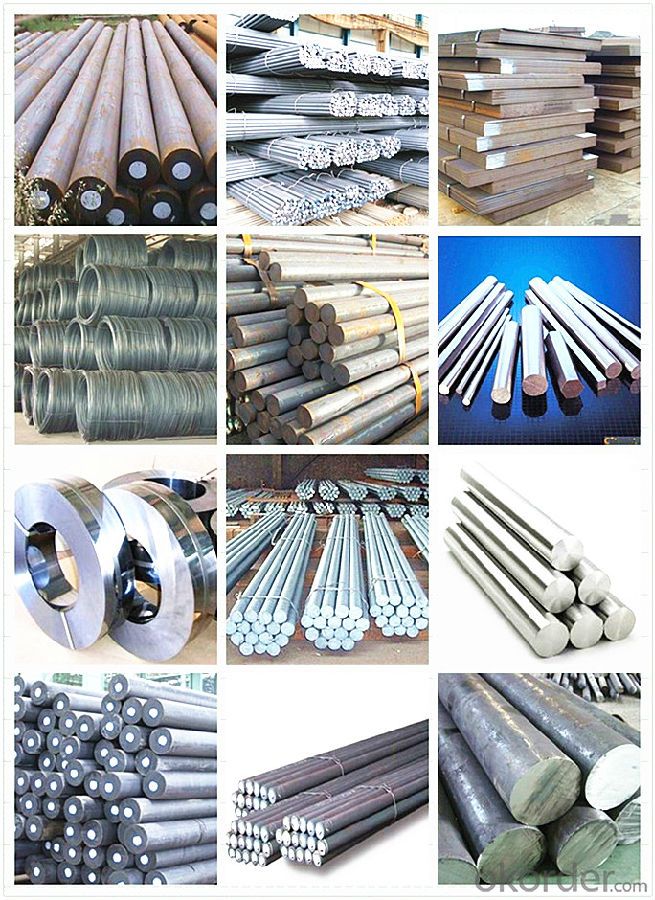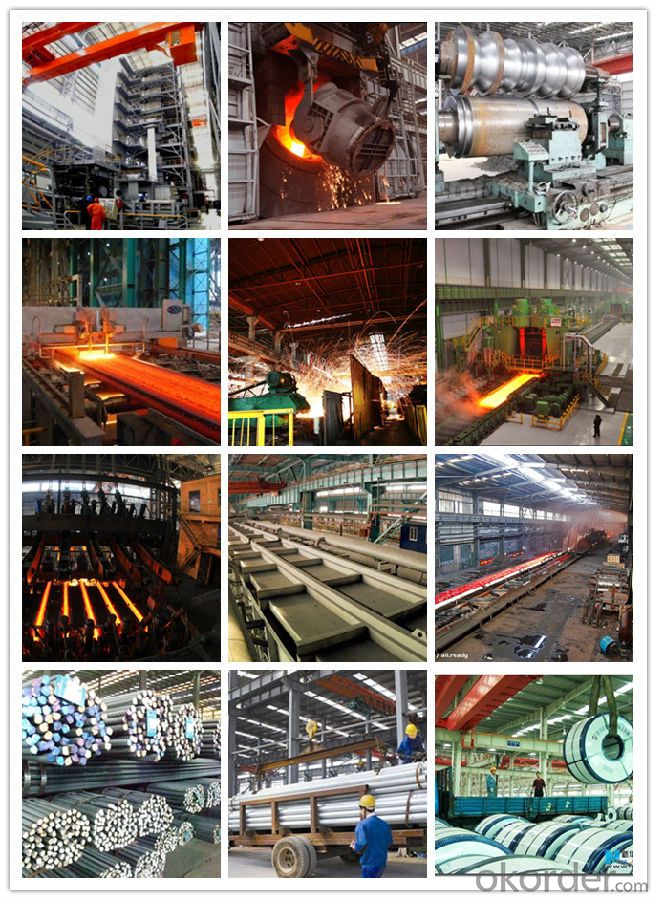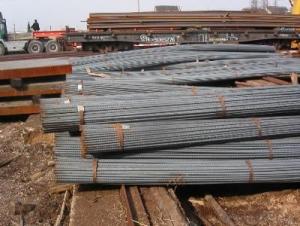Special Steel ASTM1020 Carbon Structural Steel
- Loading Port:
- China main port
- Payment Terms:
- TT OR LC
- Min Order Qty:
- 30 m.t.
- Supply Capability:
- 10000 m.t./month
OKorder Service Pledge
OKorder Financial Service
You Might Also Like
Item specifice
Product information:
1.Chemical performance:
Model | C | Si | Mn | P | S |
GB45 | 0.42-0.50 | 0.17-0.37 | 0.50-0.80 | 0.030 | 0.030 |
2.Mechanical performance:
Strength of extension | 600MPA |
Yield point | 355MPA |
Elongation | 16% |
Contractibility rate | 40% |
Impacting energy | 39J |
3.Size tolerance:
Length tolerance | +100mm/-0mm |
diameter tolerance | +/-1.0mm |
Straightness | Max 6mm/m |
4.
specification | Outer Diameter:14mm-180mm |
Standard | GB,JIS,DIN,AISI,ASTM,ISO,NF |
Certificate | ISO9001-2008 |
Application | A) General service industries (petroleum, food, chemical, paper, fertilizer, Fabric, aviation and nuclear) B) Fluid, gas and oil transport C) Pressure and heat transmission D) Construction and ornament E) Boiler heat exchangers |
Test | flaw detection According to customers' requests |
Processing | Cold Drawn/Cold Rolled/Hot Rolled |
Packing | as your requirement |
trade term | FOB; CNF; CIF PORT: TIANJIN, China |
payment | T/T ,L/C,D/P |
delivery time | Within 15 DAYS |
Product Show:

Workshop Show:

Shipping
1. FedEx/DHL/UPS/TNT for samples, Door-to-Door;
2. By Air or by Sea for batch goods, for FCL; Airport/ Port receiving;
3. Customers specifying freight forwarders or negotiable shipping methods!
Delivery Time: 3-7 days for samples; 5-25 days for batch goods.
Payment Terms
1.Payment: T/T, L/C, Western Union, MoneyGram,PayPal; 30% deposits; 70% balance before delivery.
2.MOQ: 1pcs
3.Warranty : 3 years
4.Package Informations: 1) EXPORT, In 20 feet (GW 25 ton) or 40 feet Container (GW 25 ton)
2)as customer's requirement
Why choose us?
(1) The leading exporter in China special steel industry.
(2) Large stocks for various sizes, fast delivery date.
(3) Good business relationship with China famous factories.
(4) More than 7 years steel exporting experience.
(5) Good after-sales service guarantee.
- Q:What are the main characteristics of structural steel?
- Structural steel is a widely used material in construction due to its exceptional properties and characteristics. The main characteristics of structural steel include: 1. Strength: Structural steel has a high strength-to-weight ratio, making it a durable and reliable material for various construction applications. It can withstand heavy loads and forces without losing its structural integrity. 2. Flexibility: Structural steel offers flexibility in design and construction. It can be easily fabricated into different shapes and sizes to meet specific project requirements. This flexibility allows architects and engineers to create unique and innovative structures. 3. Fire resistance: Steel has excellent fire-resistant properties. It is non-combustible, meaning it does not burn or contribute to the spread of fire. This makes structural steel a safe choice for buildings where fire protection is crucial, such as high-rise structures. 4. Sustainability: Structural steel is a sustainable material as it is highly recyclable. Steel can be reused or repurposed at the end of its lifespan, reducing waste and conserving natural resources. Additionally, steel structures can be designed to be energy-efficient, further contributing to sustainability. 5. Cost-effective: Structural steel offers a cost-effective solution for construction projects. It is readily available, making it more affordable compared to other construction materials. Its strength and durability also result in reduced maintenance and repair costs over the long term. 6. Speed of construction: Steel structures can be fabricated off-site and then quickly erected on-site, leading to faster construction timelines. This reduces project duration and costs, making structural steel an ideal choice for time-sensitive projects. 7. Design versatility: Structural steel allows for a wide range of architectural designs. Its strength and flexibility enable the creation of large, open spaces with minimal support columns, providing architects with design freedom. This versatility makes steel an attractive option for various building types, including commercial, industrial, and institutional structures. In summary, the main characteristics of structural steel include its strength, flexibility, fire resistance, sustainability, cost-effectiveness, speed of construction, and design versatility. These qualities make it a preferred choice for construction projects worldwide.
- Q:How does special steel perform in food processing applications?
- Special steel is widely used in food processing applications due to its unique properties and benefits. One of the key advantages of special steel in this industry is its exceptional corrosion resistance. Food processing involves exposure to various corrosive substances such as acids, alkalis, and salt solutions. Special steel, such as stainless steel, has a high chromium content that forms a protective oxide layer on its surface, preventing corrosion and ensuring the hygiene and safety of the processed food. Furthermore, special steel is highly durable and resistant to wear and tear. Food processing equipment often undergoes rigorous and repetitive operations, such as cutting, grinding, and mixing. Special steel's high strength and toughness allow it to withstand these demanding applications without compromising its performance or integrity. This durability ensures a longer lifespan for the equipment, minimizing downtime and maintenance costs. Special steel also offers excellent heat resistance, making it suitable for high-temperature food processing applications. It can withstand extreme temperatures without losing its mechanical properties, maintaining its structural integrity and preventing any contamination risks. Moreover, special steel is easy to clean and maintain, which is crucial in the food processing industry. Its smooth surface and non-porous nature prevent the accumulation of food particles, bacteria, and other contaminants, ensuring a high level of hygiene. Special steel is also resistant to chemical cleaning agents and can be easily sterilized, making it an ideal material for food processing equipment. In summary, special steel performs exceptionally well in food processing applications due to its corrosion resistance, durability, heat resistance, and ease of maintenance. Its properties contribute to the safety, efficiency, and longevity of food processing equipment, ensuring high-quality and hygienic food production.
- Q:Can special steel be used for medical implants?
- Yes, special steel can be used for medical implants. It is commonly used in the manufacturing of medical devices and implants due to its exceptional strength, corrosion resistance, and biocompatibility. Special steel alloys, such as stainless steel or titanium alloys, are often utilized for various types of medical implants, including joint replacements, dental implants, and bone fixation devices.
- Q:What are the properties of wear-resistant alloy steel?
- Wear-resistant alloy steel possesses properties such as high hardness, toughness, and strength, making it resistant to abrasion, impact, and wear. It also exhibits excellent heat resistance, corrosion resistance, and dimensional stability, allowing it to maintain its integrity even under harsh operating conditions.
- Q:How is tool steel used in the manufacturing of molds and dies?
- Tool steel is commonly used in the manufacturing of molds and dies due to its excellent hardness, toughness, and wear resistance properties. It is used to create molds and dies that can withstand high pressures and temperatures during the manufacturing process. Tool steel is ideal for shaping and forming materials, such as plastic or metal, as it provides the necessary strength and durability to produce accurate and precise components. Additionally, tool steel can be easily machined and heat-treated to enhance its performance, making it an essential material in the manufacturing industry.
- Q:How does special steel contribute to the power generation sector?
- Special steel contributes to the power generation sector by offering enhanced strength, durability, and corrosion resistance properties required for critical components such as turbine blades, shafts, and boiler tubes. This high-performance steel ensures efficient power generation by withstanding extreme temperatures and pressures, thereby increasing the overall efficiency and reliability of power plant operations.
- Q:How is nitriding steel used in surface hardening processes?
- Nitriding steel is used in surface hardening processes by introducing nitrogen into the steel's surface, resulting in the formation of a hard and wear-resistant outer layer. This process enhances the steel's mechanical properties, such as hardness, fatigue strength, and wear resistance, making it ideal for applications where high durability and resistance to abrasion are required.
- Q:What are the different forging techniques for special steel?
- For special steel, different forging techniques can be utilized depending on the desired properties and characteristics of the final product. Some commonly employed techniques are as follows: 1. Open-die forging, also known as smith forging or hand forging, involves shaping the steel between two flat dies or anvils. The metal is heated and hammered repeatedly until it achieves the desired shape. This technique is suitable for larger and more intricate components like shafts, cylinders, or discs. 2. Closed-die forging, also called impression-die forging, entails shaping the steel within a set of dies that contain the desired shape. The metal is placed between the dies and compressed under high pressure. Closed-die forging is often used for smaller, more intricate components, providing greater control over the final shape and dimensions. 3. Roll forging involves passing the steel between two or more rotating rolls to shape it. The rolls exert pressure on the metal, causing it to deform and acquire the desired shape. This technique is commonly used for producing long, cylindrical components such as axles, bars, or rings. 4. Upset forging involves deforming the steel by reducing its length and increasing its cross-sectional area. The metal is placed between two dies and axially compressed, resulting in bulging and the desired shape. Upset forging is commonly utilized for producing short, thick components like bolts, screws, or nuts. 5. Press forging, similar to closed-die forging, employs a hydraulic or mechanical press to shape the steel. The metal is placed between two dies and compressed under high pressure, allowing controlled deformation. Press forging enables precise control over the shaping process and is often employed for producing high-quality and complex components. Each of these forging techniques possesses its own advantages and limitations, and the choice of technique relies on factors such as size, complexity, and desired properties of the final product. By selecting the appropriate forging technique, manufacturers can ensure that special steel components meet the required specifications and performance standards.
- Q:What are the main applications of special steel in the semiconductor industry?
- Special steel is widely used in the semiconductor industry for various applications. One of the main applications is in the manufacturing of wafer handling components such as vacuum chucks, reticle stages, and load ports. Special steel's high strength, corrosion resistance, and precision machining capabilities make it ideal for these critical components that require excellent dimensional stability and reliability. Additionally, special steel is also used in the construction of cleanroom equipment, such as gas cabinets, exhaust systems, and process tools, where its resistance to chemical and thermal stress is highly valued. Overall, special steel plays a crucial role in ensuring the efficiency, accuracy, and safety of semiconductor manufacturing processes.
- Q:Can special steel be used in the production of bearings?
- Yes, special steel can be used in the production of bearings. Special steel alloys, such as chromium steel or stainless steel, are often utilized in bearing manufacturing due to their high strength, corrosion resistance, and ability to withstand heavy loads and extreme temperatures. These properties make special steel an ideal choice for ensuring the durability and performance of bearings in various industrial applications.
1. Manufacturer Overview |
|
|---|---|
| Location | |
| Year Established | |
| Annual Output Value | |
| Main Markets | |
| Company Certifications | |
2. Manufacturer Certificates |
|
|---|---|
| a) Certification Name | |
| Range | |
| Reference | |
| Validity Period | |
3. Manufacturer Capability |
|
|---|---|
| a)Trade Capacity | |
| Nearest Port | |
| Export Percentage | |
| No.of Employees in Trade Department | |
| Language Spoken: | |
| b)Factory Information | |
| Factory Size: | |
| No. of Production Lines | |
| Contract Manufacturing | |
| Product Price Range | |
Send your message to us
Special Steel ASTM1020 Carbon Structural Steel
- Loading Port:
- China main port
- Payment Terms:
- TT OR LC
- Min Order Qty:
- 30 m.t.
- Supply Capability:
- 10000 m.t./month
OKorder Service Pledge
OKorder Financial Service
Similar products
New products
Hot products
Related keywords






























